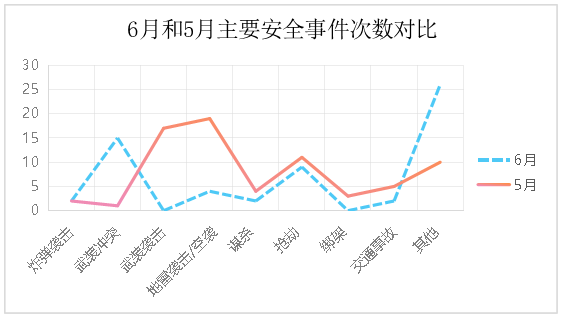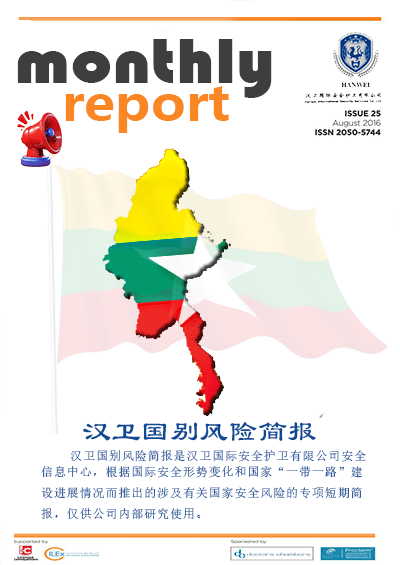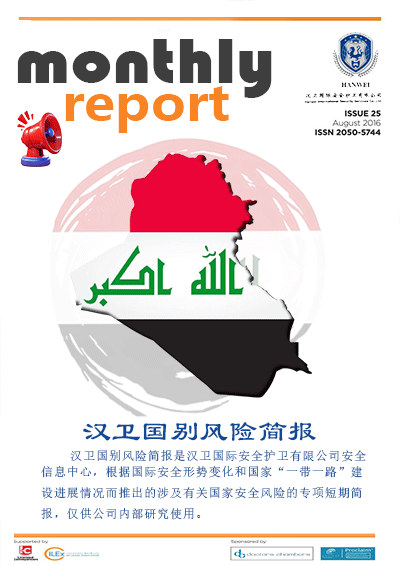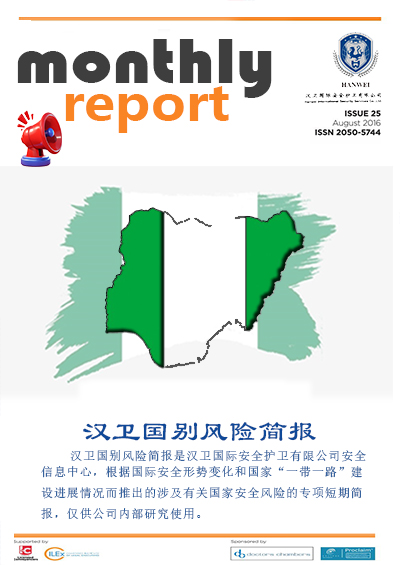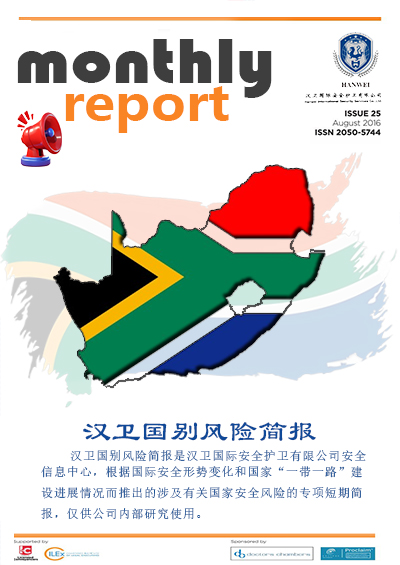According to the security public opinion report of Hanwei International, a total of 106,139 representative security incidents of various types occurred in Myanmar in June, 33 fewer than in May. The total number of deaths and injuries caused by various security incidents was 112. Among the security categories sorted out, security incidents are mainly armed conflicts and catching bloggers. The security incidents mainly occurred in Shan State, Mandalay Province and other places.
Hanwei International Analysis shows that the situation in many areas of Myanmar has deteriorated and conflicts have been ongoing. Despite the Myanmar military government's renewed announcement of extending the ceasefire period, the number of attacks remains high. According to the statistics, the number of safety incidents has decreased compared to last month, the number of deaths has dropped, and the number of injuries has increased. The increase in the number of injuries is mainly due to the rise in the number of patients with diarrhea and COVID-19 caused by the rainy season.
Continue to extend the ceasefire and advance post-disaster reconstruction. According to Myanmar media reports, on May 31, the Office of the Commander-in-Chief of the Defense Forces issued a statement saying that the temporary ceasefire period will be extended from June 1 to June 30. The statement said: The defense forces have implemented a temporary ceasefire, aiming to take this opportunity to carry out rescue, relief and recovery operations in areas severely affected by the strong Mandalay earthquake, which has caused extensive losses and damage. At present, with the assistance of the international community, the government is continuously carrying out post-earthquake reconstruction work in the areas affected by the earthquake. On June 17th, the two sides held talks in Danlun Village, Denny District, First District of the Union of Myanmar, chaired by representatives of the United Wa State Army (UWSA). Officials from both sides attended the meeting, had in-depth discussions on relevant issues, and agreed to peacefully resolve recent differences of opinion in accordance with the principle of "turning major issues into minor ones and minor ones into nothing". Mr. Peng Dejun, the representative of the "Allied Forces", stated: "The 'Allied Forces' do not wish to have conflicts with any other ethnic armed groups." We hope to get along amicably with all ethnic armed groups in Myanmar. On June 17th, the Shan State Army and the Kokang Allied Forces resumed negotiations in Nam Bang Village, Raso, Shan State due to territorial disputes. The deputy chief of the General Staff of the Shan State Army and the military commander of the Kokang Allied Forces led a delegation for talks, but no agreement was reached. On the 19th, the top leaders of both sides met again. Under the witness of representatives of the United Wa State Army, they agreed to peacefully resolve the conflict. The Kokang United Army stated that it has no intention of conflicting with other ethnic armed groups and aims to curb the recent escalation of armed conflicts.
Accelerate the preparations for the general election.On June 12th, Min Chin, the Minister of Immigration of the Myanmar military government, presided over a meeting in Naypyidaw, coordinating with the Ministry of Immigration, the Federal Election Commission and other institutions to advance the improvement of the voter list. He demanded the comprehensive collection of data on citizens aged 18 and above to ensure that qualified voters can run for election with valid identification. On the 19th, the military government promulgated the third amendment to the Federal Election Commission Act, allowing national civil servants to serve as chairpersons of branches of election commissions at all levels, breaking the previous limitation that only those with high social prestige were elected. After the revision, the branch shall consist of at least three people, among whom the chairperson can be a civil servant and an elected official shall be designated as the secretary. This move is the latest action by the military government to strengthen its electoral control. On June 21st, the chairperson of the Federal Election Commission of Myanmar stated at a coordination meeting that they are making every effort to promote the use of electronic voting machines in the upcoming national elections to ensure the accuracy and convenience of voting and prevent fraud. At present, the electronic voting machines needed for the election are under production. The obtained equipment is being transported to various provinces and states for proper storage and maintenance to ensure its good condition.
Earthquakes are likely to cause lasting economic trauma.According to the World Bank's estimation, the direct damage to infrastructure caused by the Mandalay earthquake that occurred on March 28th could reach 11 billion US dollars. The World Bank pointed out this in its "Myanmar Economic Monitoring Report" released on June 12. The losses caused by this earthquake are equivalent to 14% of Myanmar's GDP. Due to the earthquake, 17 million people in Mandalay, Sagaing, Bago, Magui and Naypyidaw in Myanmar were affected, and about 9 million people were displaced. Malaysian plastic Packaging company Scientex announced recently that it will withdraw from the operation of its joint venture in Myanmar, Daibochi Packaging Myanmar. The company stated in its recently released report that it has decided to withdraw its investment as it has not seen any signs of improvement in its business in Myanmar recently. The company's statement pointed out that the continuous economic and political instability in Myanmar in recent years has brought significant challenges to operations. This divestment decision aims to reduce operational and financial risks and optimize cost management. It is reported that the Myanmar Economic Bank located in Lashau City, northern Shan State, will officially open at 9 a.m. on June 3rd, providing local residents with basic banking services such as savings, transfers and loans. However, according to sources, the network and telephone lines in some areas of Lashio are still temporarily disrupted, which may cause ATMs to be unable to connect in real time, delay inter-bank transfers and restrict online services. The bank suggests that residents bring paper documents when handling important business or call the branch in advance to inquire about the specific service situation.
The post-disaster reconstruction is a long and arduous task.According to official media reports from Myanmar, the Central Bank of Myanmar (the Central Bank of Myanmar) announced on June 16 that it would sell 10 million US dollars of foreign exchange funds to importers. This is the latest move in a series of measures the bank has recently taken to stabilize the foreign exchange market. According to the operation records released by the central bank, on June 16th, 1.37 million US dollars were sold to edible oil import companies and 1.05 million US dollars to other commodity importers. These foreign exchange funds originated from enterprises engaged in cutting, manufacturing and packaging (CMP).
Zte Corporation, in collaboration with the China Foundation for Rural Development, distributed supplies at the Rebo Temple in Mandalay. A total of 200 bags of rice and 200 cases of mineral water were distributed, and 50 simple tents were set up, benefiting 250 affected families. Although more than two months have passed since the earthquake, the care and support from Chinese enterprises have never ceased. Zte pays close attention to the actual needs of the people after the disaster and supports the affected people in resuming their normal life. Zte not only focuses on the present when the disaster occurs, but also pays attention to the long-term recovery and reconstruction, and takes practical actions to support the post-disaster recovery work.
On June 17th, the Asian Development Bank announced an additional 100 million US dollars in humanitarian aid to Myanmar to support the earthquake reconstruction efforts. In addition to the initial emergency allocation of 3 million US dollars, the new funds will be used for basic needs such as food and medical care, and will also cover women's health services, school renovations, and the construction of community libraries. The assistance also involves upgrading rural infrastructure and training in disaster risk management to enhance the disaster resilience of disaster-stricken areas.
Attacks keep coming and the flames of war continue.On June 4th, the Rakhine Army engaged in a firefight with the Rohingya Salvation Army in the northern part of Mengdu Town and occupied one of their camps. On the 8th, the Myanmar army launched an air strike on the town of Dandui, resulting in 4 deaths and 10 injuries. On June 17th, the De 'ang National People's Liberation Army and the Myanmar army engaged in fierce battles in Naoku Town, and the conflict spread to seven villages in the south and west. The Burmese army attempted to launch a three-pronged attack on Naoku. Two forces advanced along the road in the direction of Dongkan, and battles also broke out on the Mandala-Musa road. The front line was expanding. On June 19th, a battle broke out between the Myanmar army and the Minjian Black Tiger anti-government armed group in Minjian Town, resulting in the deaths of four people, including one colonel, and seven others injured. The attack occurred at multiple time points on the evening of June 29th. At 8:35 p.m., 8:40 p.m. and 8:53 p.m., the bombs from the air raid fell one after another. One of the bombs fell into an open farmland, causing no direct casualties. The other four bombs landed on vacant houses, causing severe damage to them. Another one was left in a deserted 502 military camp. Local residents said that some people had fled the town out of fear of air strikes.
According to the Public Health Department of the Ministry of Health of Myanmar, in the more than four months from January to May 10th this year, there have been over 860 cases of dengue fever across the country, and four deaths have been caused. A confirmed case of COVID-19 was discovered on May 27th. Hanwei International suggests: Dengue fever is usually transmitted through mosquito bites during the rainy season, especially among young children. Paying attention to preventing mosquito bites and seeking medical treatment in a timely manner are the keys to avoiding life-threatening situations. Regarding the epidemic, we remind the general public not to let their guard down and continue to take personal protective measures, such as wearing masks, washing hands frequently, and maintaining social distancing, to jointly prevent the spread of the epidemic.
Emergency call number in Myanmar: 0095-199. Medical emergency call number in Myanmar: 0095-192. Consular protection and assistance call number of the Consulate General of China in Mandalay: 0095-9-259172726. Consular protection and assistance call number of the Embassy of China in Myanmar: The 24-hour Global Consular Protection and Service hotline of the Ministry of Foreign Affairs (0086-10-12308 or 0086-10-65612308) is 0095-9-43209657
Chart 1: Classification of Security Incidents in June
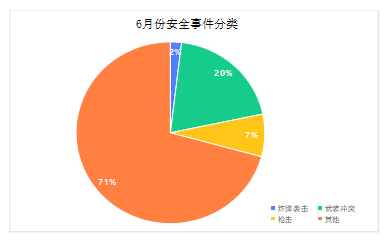
Chart 2: Classification Statistics of Deaths/Injuries in June
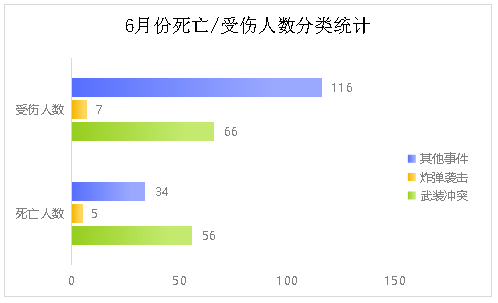
Chart 3: Statistics of Security Incidents in Major Provinces in June
